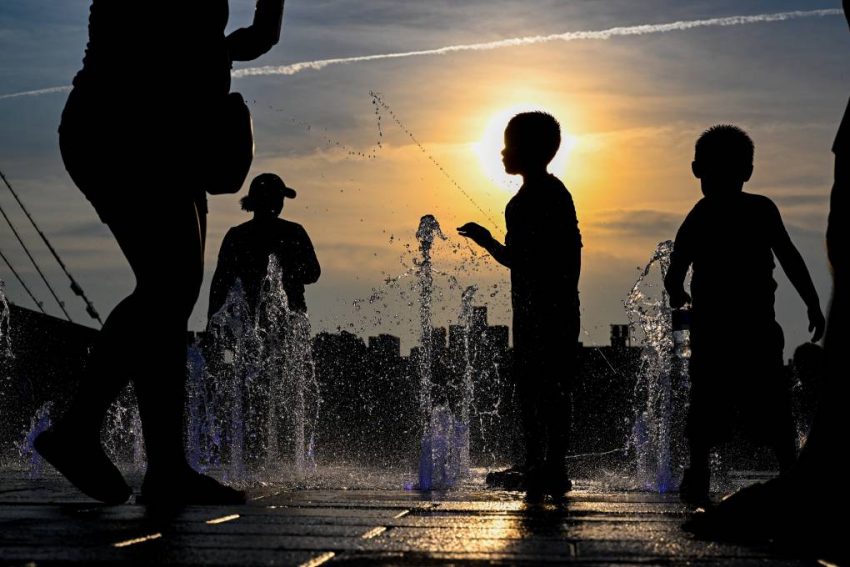
However more and more, the climate doesn’t allow. And leaders on the planet of early childhood growth are beginning to name consideration to the crucial to design and improve baby care facilities — and the cities the place they’re situated — for our climate-altered world, with the wants of the youngest in thoughts.
“They’ve the least accountability for inflicting the local weather disaster however will bear the brunt of it,” stated Angie Garling, vp for early care and training for the Low Earnings Funding Fund, and a member of the Early Years Local weather Motion Activity Drive, which has simply issued its first set of recommendations. (Full disclosure, I’m an advisor to This Is Planet Ed, which convened the duty drive in collaboration with the assume tank Capita.)
“One of many issues now we have to do is take the climate resources coming through the Inflation Reduction Act, and ensure that we prioritize younger kids, each in multifamily housing and early care/training,” stated Garling. However whereas kids underneath 5 have a developmental have to spend time exterior, excessive climate — whether or not warmth, wildfire smoke or different air air pollution — is especially harmful for this age group. Younger kids breathe twice as a lot air per pound of physique weight, Garling identified.
Ankita Chachra is a designer, architect and new mom engaged on the problem of climate-resilient cities for youngsters on the assume tank Capita. She not too long ago blogged about selections made in cities around the globe, from Copenhagen to her native Delhi, that may assist protect out of doors play. These can generally be easy diversifications. When it’s highly regarded, Ramos, for instance, takes her kids exterior very first thing within the morning.
“Copenhagen has parks that do flood with excessive rain,” Chachra stated, however permeable surfaces, like grass, enable the water to empty away shortly. “Asphalt, rubber, and steel get extraordinarily heated whenever you don’t have shade to guard these surfaces. Grass, mulch and wooden take in warmth otherwise. A shaded avenue or space is four levels Celsius cooler than people who don’t have shade,” she added. And when cities make room for parks over automobiles, there may be extra equitable entry to protected, cooler out of doors house.
Cori Berg, in Dallas, is grateful for her yard’s “two big pecan bushes — these big shade constructions are actually costly.”
When kids simply can’t go exterior, early baby care educators stated they must improvise. Jessica Sager, whose community All Our Kin helps in-home household baby care suppliers in 25 states, did a casual survey at The Hechinger Report’s request to ask suppliers how they’re dealing with excessive climate.
“I heard numerous tales in regards to the wildfires particularly,” she stated — the smoke from Canadian fires affected a minimum of 120 million Americans this summer. “Our educators had air purifiers — we had gotten them throughout Covid. Our coaches had already labored with educators about doing indoor gross motor play — impediment programs, scavenger hunts. Balls, scarves, parachutes. Placing a mattress on the ground and letting youngsters soar up and down. Lots of music and dance actions. Or placing coloured tape on the ground and pretending it’s a steadiness beam. ”
On a city-wide stage, some have proposed bringing again free or low-cost indoor play areas, such because the McDonald’s ball pit, maybe repurposing disused procuring malls.
However regardless of all this creativity, it’s emotionally troublesome for each suppliers and kids when kids can’t play exterior due to extreme climate and different hazards — Berg’s “cranky climate.”
“In the course of the smoke some youngsters felt very unhappy that they couldn’t go exterior,” stated All Our Kin’s Sager. “And the caregivers needed to clarify to them what was unsuitable.” There’s a “actual parallel to what caregivers needed to do throughout Covid,” to make a scary actuality comprehensible for little youngsters, she stated.
Garling and different policymakers are acutely aware that they’re citing local weather threats at a time when the early childhood sector already feels besieged.
The USA authorities spends much less than the average of its peer countries on early baby growth in a great 12 months, and supplemental funds supplied through the pandemic have just fallen off a cliff, leaving the sector much more money starved. Group baby care in personal houses is commonly mother and father’ most reasonably priced answer: The National Center for Education Statistics says 1 in 5 kids underneath 5 spend time in these settings.
However these home-based packages pose a serious infrastructure problem. Garling’s group not too long ago launched a new interactive map displaying that in New York Metropolis, these facilities usually — 37.2% of the time — embody basement house. And 1,638 facilities, serving 22,000 kids, are prone to flooding in storms such because the one which hit town with greater than 8 inches of rain on September 29.
“At occasions it feels overwhelming. There’s so many issues early care and training professionals have to fret about,” Garling stated. However then again, she argued, there are federal funds the sector can and will declare for retrofitting and upgrades now.
“I really feel like there are present alternatives by way of [the Inflation Reduction Act] which are creating extra urgency — in a great way,” she stated. “This isn’t one thing I used to be speaking about two years in the past and now it’s 80% of what I speak about on a regular basis. “
Within the meantime, early childhood educators are working onerous to instill a love of nature within the kids they take care of, in all types of climate. Berg has been taking her academics on nature walks, and launched a curriculum about Texas’s many state parks.
The Connecticut baby care proprietor, Ramos, who grew up visiting a farm in her native Peru, sees empathy blooming in her toddlers as they encounter the pure world. “In the future a one 12 months previous was strolling and noticed somewhat slug on the bottom,” she recounted. “He factors — ‘Oh no, oh no!’ He was so unhappy. The daddy instantly went down, picked it up and put it on the grass. It made my day.”
















